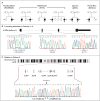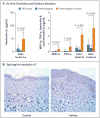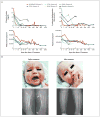An autoinflammatory disease with deficiency of the interleukin-1-receptor antagonist
- PMID: 19494218
- PMCID: PMC2876877
- DOI: 10.1056/NEJMoa0807865
An autoinflammatory disease with deficiency of the interleukin-1-receptor antagonist
Abstract
Background: Autoinflammatory diseases manifest inflammation without evidence of infection, high-titer autoantibodies, or autoreactive T cells. We report a disorder caused by mutations of IL1RN, which encodes the interleukin-1-receptor antagonist, with prominent involvement of skin and bone.
Methods: We studied nine children from six families who had neonatal onset of sterile multifocal osteomyelitis, periostitis, and pustulosis. Response to empirical treatment with the recombinant interleukin-1-receptor antagonist anakinra in the first patient prompted us to test for the presence of mutations and changes in proteins and their function in interleukin-1-pathway genes including IL1RN.
Results: We identified homozygous mutations of IL1RN in nine affected children, from one family from Newfoundland, Canada, three families from The Netherlands, and one consanguineous family from Lebanon. A nonconsanguineous patient from Puerto Rico was homozygous for a genomic deletion that includes IL1RN and five other interleukin-1-family members. At least three of the mutations are founder mutations; heterozygous carriers were asymptomatic, with no cytokine abnormalities in vitro. The IL1RN mutations resulted in a truncated protein that is not secreted, thereby rendering cells hyperresponsive to interleukin-1beta stimulation. Patients treated with anakinra responded rapidly.
Conclusions: We propose the term deficiency of the interleukin-1-receptor antagonist, or DIRA, to denote this autosomal recessive autoinflammatory disease caused by mutations affecting IL1RN. The absence of interleukin-1-receptor antagonist allows unopposed action of interleukin-1, resulting in life-threatening systemic inflammation with skin and bone involvement. (ClinicalTrials.gov number, NCT00059748.)
2009 Massachusetts Medical Society
Figures





Comment in
-
Interleukin-1beta and the autoinflammatory diseases.N Engl J Med. 2009 Jun 4;360(23):2467-70. doi: 10.1056/NEJMe0811014. N Engl J Med. 2009. PMID: 19494224 No abstract available.
References
-
- Stojanov S, Kastner DL. Familial autoinflammatory diseases: genetics, pathogenesis and treatment. Curr Opin Rheumatol. 2005;17:586–99. - PubMed
-
- Ancient missense mutations in a new member of the RoRet gene family are likely to cause familial Mediterranean fever. Cell. 1997;90:797–807. - PubMed
-
- French FMF Consortium. A candidate gene for familial Mediterranean fever. Nat Genet. 1997;17:25–31. - PubMed
-
- Wise CA, Gillum JD, Seidman CE, et al. Mutations in CD2BP1 disrupt binding to PTP PEST and are responsible for PAPA syndrome, an autoinflammatory disorder. Hum Mol Genet. 2002;11:961–9. - PubMed
Publication types
MeSH terms
Substances
Associated data
Grants and funding
LinkOut - more resources
Full Text Sources
Other Literature Sources
Medical
Molecular Biology Databases
